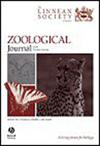鳐鱼(软骨鱼类:鳐形目:Rajiformes)的下颌、舌骨和下支气管肌肉:术语修订和系统发育意义
IF 3
2区 生物学
Q1 ZOOLOGY
引用次数: 0
摘要
约有 300 个有效物种被归入软骨鱼类中最大的类群--姬形目。形态学和分子推论高度支持该目单系,但对其成员的下颌肌、舌骨肌和下鳃肌却知之甚少。本研究旨在描述和说明胭脂鱼的下颌肌、舌骨肌和下鳃肌的形态变异,回顾其术语,并讨论所观察到的情况在系统发育和功能方面的意义。人工解剖了 22 个乙醇保存的标本,这些标本属于目前被认为有效的 36 个鳐属中的 19 个。提出了九个新特征,并进行了支系测试。观察到的主要差异是腭咽上提肌肌肉单位的相对宽度、颌间肌后部的插入点和延伸、面神经和下颌上提肌的相对位置、颌角肌的起源和插入、颌角下颌肌的延伸以及眶前肌中段和颌间肌前段的出现。当与其他形态特征一起分析时,肌肉特征在了解鳐类之间的相互关系方面发挥了关键作用。尽管如此,我们还需要进行更多的研究,以提高我们对鳐形目系统学以及下颌肌、舌骨肌和下鳃肌功能的认识。本文章由计算机程序翻译,如有差异,请以英文原文为准。
Mandibular, hyoid, and hypobranchial musculature in skates (Chondrichthyes: Batoidea: Rajiformes): revised terminology and phylogenetic implications
About 300 valid species are classified within the order Rajiformes, the largest group of chondrichthyans. The monophyly of this order is highly supported by morphological and molecular inferences, but little is known about the mandibular, hyoid, and hypobranchial muscles of its members. This study aims to describe and illustrate the morphological variation in mandibular, hyoid, and hypobranchial muscles among rajiforms, review their terminology and discuss the phylogenetic and functional implications of conditions observed. Twenty-two ethanol-preserved specimens belonging to 19 of the 36 skate genera currently considered valid were manually dissected. Nine new characters are proposed and tested cladistically. The main differences observed are the relative width of muscle units of the levator palatoquadrati, insertion point and extension of the intermanibularis posterior, relative position of the facialis nerve and the levator hyomandibularis muscle, origin and insertion of the coracomandibularis, extension of the coracohyomandibularis, and occurrence of the preorbitalis medialis and intermandibularis anterior. When analysed together with other morphological features, muscle characters have shown to play a key role in the understanding of interrelationships among skates. Nevertheless, additional studies are needed to improve our knowledge of rajiform systematics and the functionality of mandibular, hyoid, and hypobranchial muscles.
求助全文
通过发布文献求助,成功后即可免费获取论文全文。
去求助
来源期刊
CiteScore
6.50
自引率
10.70%
发文量
116
审稿时长
6-12 weeks
期刊介绍:
The Zoological Journal of the Linnean Society publishes papers on systematic and evolutionary zoology and comparative, functional and other studies where relevant to these areas. Studies of extinct as well as living animals are included. Reviews are also published; these may be invited by the Editorial Board, but uninvited reviews may also be considered. The Zoological Journal also has a wide circulation amongst zoologists and although narrowly specialized papers are not excluded, potential authors should bear that readership in mind.

 求助内容:
求助内容: 应助结果提醒方式:
应助结果提醒方式:


